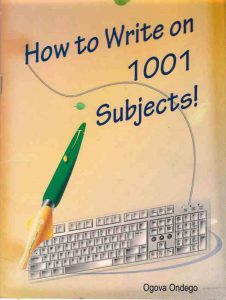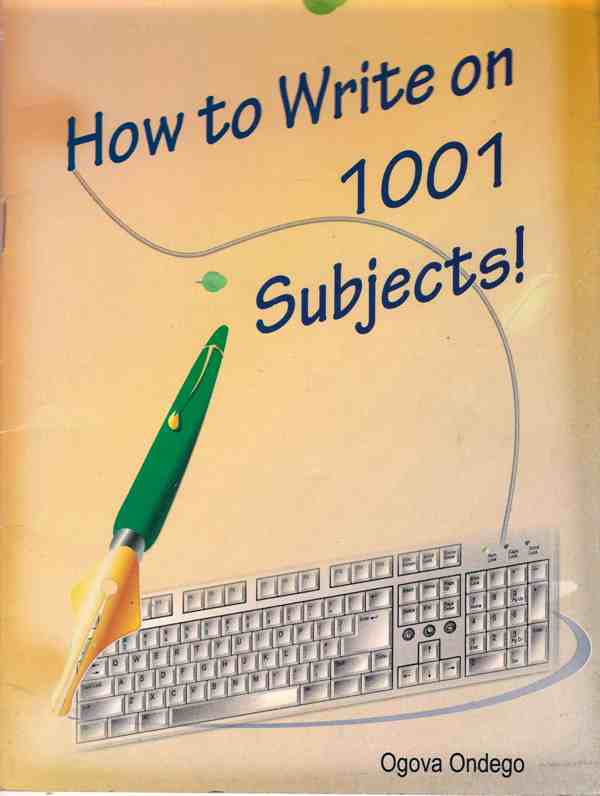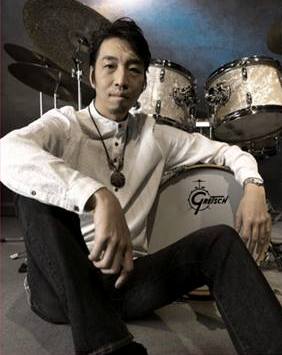By Sheila Waswa
Published November 15, 2016
 How To Write On 1001 Subjects! is one guidebook every communicator should read.
How To Write On 1001 Subjects! is one guidebook every communicator should read.
True to the observation on the blurb that ‘Writing is a game to be played only by those who understand the rules that govern it’ the 44-page compass for writers leaves little to chance.
RELATED:How Literature Prizes Affect the Book Market
The book has traversed the odds, making use of easy-to-understand English to chronologically take the reader right from the basics of ‘How We Write’ to the not-so-basic of ‘How to Appreciate the Arts’.
The first section of the guide that defines writing as the practice of putting thoughts, words, ideas or facts on paper or computer stresses that the skill calls for maximum concentration, focus, discipline and determination while ensuring that facts and data used are verified.
Quoting Critical Media Education in African Context—Ogova Ondego, the author of the book—writes that writing should make a special contribution to the way people think, contribute to personal development and deepen the understanding of new concepts.
RELATED:Children’s Book Setting Grips Animator
Every piece of writing must be anchored on a theme, an outline and follow a chronological order based on the classic three-part formula: introduction, middle and conclusion.
 Honesty–as of one writing only what he has experienced firsthand or through observation, research and interviews–should also be adhered to in writing.
Honesty–as of one writing only what he has experienced firsthand or through observation, research and interviews–should also be adhered to in writing.
In order to produce a greater effect and make the language ‘live’ and engaging, the guide has expounded on 22 figures of speech, illustrating them with examples that are easy to understand.
While the second part of the book explains the role of mass media, journalism and how News is written, the third sections dwells on how to appreciate the arts, the role of critics in creativity, the language of criticism and the skills of critics.
Tips on how to interview sources as well as the questioning techniques for interviewers are also tackled in the little BIG book.
Stressing that Arts Appreciation and Criticism requires one to understand the general concepts and terms used across the arts and humanities, How To Write On 1001 Subjects! also explores historical periods or eras that are characterised by certain cultural styles that make it possible for critics to study, compare, contrast and make certain informed generalizations.
RELATED: ComMattersKenya Publications
The guide says a work of art cannot be understood, indeed fully appreciated without looking at its form and the context within which it is created. The angle or perspective of the critic—gender, religious, economic, historical—too, makes a difference.
 It then explains how each art form–fine art, literary art, music art, screen art, architecture—is analysed. Analysis of movies is given special treatment, with a prominence that expounds it into interesting segments that are not only beneficial for a critic, a writer, a journalist and a judge or adjudicator of film: definition, history, language, genres, and the differences and similarities among Hollywood (USA), Bollywood (India) and Nollywood (Nigeria and Africa) aesthetics.
It then explains how each art form–fine art, literary art, music art, screen art, architecture—is analysed. Analysis of movies is given special treatment, with a prominence that expounds it into interesting segments that are not only beneficial for a critic, a writer, a journalist and a judge or adjudicator of film: definition, history, language, genres, and the differences and similarities among Hollywood (USA), Bollywood (India) and Nollywood (Nigeria and Africa) aesthetics.
Coupled with a comprehensive film glossary, a film analyst reading the guide will derive immense benefit from it.
RELATED:Commonwealth Short Story Prize 2017 Judges Named
At a glance, the book might seem like one meant for professionals in the arts and humanities but a closer look reveals that the information offered is applicable in any piece of structured writing.
How to Write On 1001 Subjects!, that costs Sh350 in Nairobi, is a book for every serious writer (nay, communicator!).





